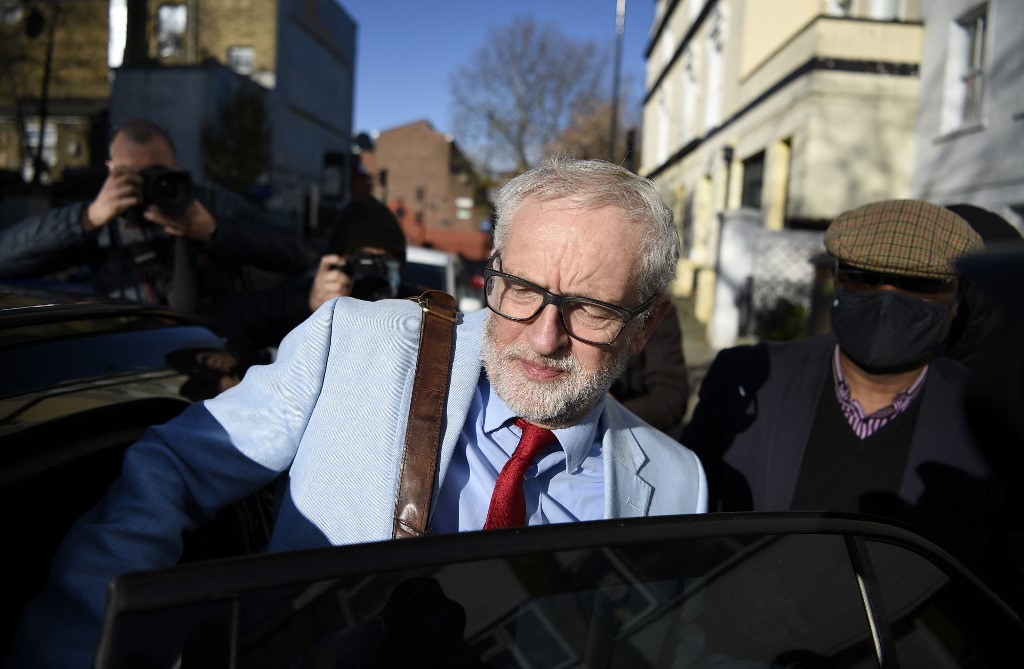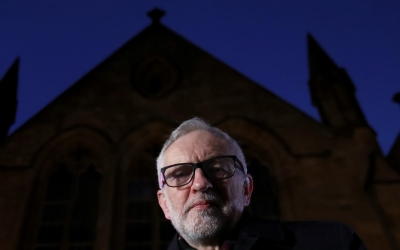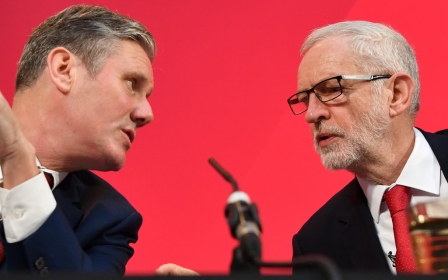Forde Inquiry exposes Labour's biggest problem: Keir Starmer

A long-delayed report by Martin Forde QC into “factionalism” within the British Labour Party during Jeremy Corbyn’s tenure was finally made public this week, more than two years after a leaked internal report detailed efforts by senior staff to undermine the former leader.
The Forde Inquiry largely confirms the disturbing picture presented by the earlier leaked report, finding that Corbyn’s team, backed by a left-wing membership that favoured his democratic socialism, was pitted against right-wing party bureaucracy and a parliamentary party both committed to maintaining the neoliberal priorities of New Labour set by former leader Tony Blair.
He criticises what he calls a 'monoculture' and 'groupthink' at head office that has left the party's senior staff unrepresentative of the membership
Party staff saw one of their main tasks as finding pretexts to expel Corbyn supporters, in what they termed “trot busting” and “trot hunting” exercises. Those same senior staff exhibited “deplorably factional and insensitive, and at times discriminatory, attitudes” towards Corbyn supporters.
Since Corbyn’s departure, there has been a mass exodus of members disillusioned with the direction the party has been taking. Forde, who was commissioned by Corbyn’s successor, Keir Starmer, to investigate those turbulent years, proposes ways to heal divisions that have threatened to tear Labour apart.
He criticises what he calls a “monoculture” and “groupthink” at head office that has left the party’s senior staff unrepresentative of the membership and has damaged Labour’s “overall effectiveness”.
New MEE newsletter: Jerusalem Dispatch
Sign up to get the latest insights and analysis on Israel-Palestine, alongside Turkey Unpacked and other MEE newsletters
Despite its ambitions, however, the 138-page report is unlikely to ease tensions in Labour. Its resolute both-sidism spreads the blame around equally, and in the process ensures no one will be satisfied.
Media firestorms
But Forde’s seeming even-handedness is, in fact, a continuation of factionalism by other means. The report’s implausible premise is that Corbyn and a handful of staff in the leader’s office wielded as much factional power as the combined might of Labour HQ, the parliamentary party and the entire media establishment. Each side was apparently equally obstructive and uncooperative; each fed the other’s political paranoia.
That misrepresents the true balance of power in Labour - and the reason why Corbyn spent his years as leader permanently on the defensive, battling internal revolts and media firestorms.
Forde castigates a Labour culture prone to leaking to the media, as though Corbyn and his team had someone - anyone - to turn to in the establishment media who would take their side.
The Blairites, by contrast, had the willing ear of journalists for any story that could be spun against Corbyn. The leaks were entirely one-sided and often devastating, representing Corbyn as shambolic and feeble-minded, a traitor, a national security threat, an antisemite, and much more. There was no meaningful counter-narrative available, outside the margins of social media.
Forde’s complaint that the leader’s office and party HQ duplicated each other’s functions and failed to develop trust sounds ludicrously divorced from the reality faced by Corbyn’s team. They found themselves at war with the party bureaucracy and had little choice but to insulate themselves from internal sabotage.
The report at least recognises that problem, even if it fails to give it proper weight. In parentheses, Forde notes, for example, that Labour staff secretly misappropriated members’ money to fund “campaigns supportive of sitting, largely anti-Corbyn MPs” while withholding funds from “campaigns for pro-Corbyn candidates in potentially Tory winnable seats”.
In the 2017 election, Corbyn could have ended up at Number 10, had he won seven knife-edge Tory seats.
Elephant in the room
But even more egregiously, Forde largely ignores the elephant in the room: that with Corbyn gone, the civil war did not peter out. It intensified.
Starmer, far from trying to find middle ground between Labour’s left and right, has actively stoked the fires on one side only. The “broad church” Forde espouses as the way forward for Labour has been repudiated by Starmer at every turn.
Not only has Starmer effectively forced Corbyn permanently out of the party and exiled his predecessor’s few allies to the backbenches, but he has also driven the Labour Party as a whole firmly back to Blairite territory. Left-wing members are being aggressively purged or made so miserable in the new environment that they leave.
Forde’s both-sides equivocations allowed a Labour spokesman to respond with the patently preposterous claim that Starmer “has made real progress in ridding the party of the destructive factionalism and unacceptable culture that did so much damage previously and contributed to our defeat in 2019”.
The reality is that Starmer has done precisely the opposite. Even with a firm grip on the leader’s office, the party bureaucracy, the front bench and the parliamentary party, the Labour right is still not satisfied. It wants to eradicate any chance of the left-wing membership ever having influence over party policy again.
Starmer has demonstrated the true meaning of “factionalism”: that the right will permanently treat the left as unwanted interlopers, and refuse any ideological compromise. That is the same power dynamic that existed when Corbyn was leader. It is just that now, with the leader’s office in the right’s pocket too, the imbalance of ideological forces arrayed against the Labour left is far harder to ignore.
Implausible both-sidism
The same lacuna can be found in the Forde report’s analysis of Labour’s “antisemitism problem”. Starmer has stepped up the crackdown on left-wing members on the basis of a supposedly continuing concern about the prevalence of antisemitism in Labour’s ranks - a claim at the heart of the Labour right’s efforts to discredit the left under Corbyn.
Notably, the Forde report concedes that antisemitism was used for factional advantage by the party’s right to damage the left. He notes: “Some anti-Corbyn elements of the party seized on antisemitism as a way to attack Jeremy Corbyn.”
In that regard, Forde quietly echoes Corbyn’s statement nearly two years ago that antisemitism in Labour was “dramatically overstated for political reasons by our opponents”. When Corbyn made that assessment, Starmer used it as a pretext to expel him from the parliamentary party.
Given the toxic legacy of the furore over antisemitism in the party, it was presumably no easy matter for Forde to acknowledge its weaponisation by the right
Given the toxic legacy of the furore over antisemitism in the party, it was presumably no easy matter for Forde to acknowledge its weaponisation by the right. Chris Williamson, a Labour MP and Corbyn ally, was expelled from the party for saying much the same.
Perhaps understandably, Forde seeks to soften the blow - again resorting to an unconvincing both-sidism - by arguing that the left was factional about antisemitism too. Corbyn’s supporters, he writes, “saw it simply as an attack on the leader and his faction - with both ‘sides’ thus weaponising the issue and failing to recognise the seriousness of antisemitism, its effect on Jewish communities and on the moral and political standing of the party”.
In the report’s telling, this counter-“weaponisation” relates to two supposed failings in the left’s approach: a denial that Labour suffered from antisemitism and insensitivity towards Jewish groups’ concerns about antisemitism.
But this entirely misses the role antisemitism has played in Labour’s civil war and why it continues to be so radioactive. In effect, Forde reproduces the very factionalism he castigates everyone else for.
Setting a trap
It was the Labour right that claimed the left denied there was antisemitism in the party. It set a trap for those on the left who questioned whether it was right to treat anything more than softball criticism of Israel as antisemitism, as Williamson, among others, discovered to his cost.
In fact, there was widespread recognition on the left that antisemitism was to be found in Labour. The left’s argument - supported by evidence - was that Labour’s antisemitism “problem” was no worse than that found in wider British society, and far less of a problem than the Conservative Party’s much-less-discussed racism against both Jews and Muslims.
The left did not deny antisemitism. They denied its characterisation as an exceptional problem in Labour. Given that the evidence supported them but was always ignored in media coverage, the left came to the view that the Labour right’s insistence on raising antisemitism at every opportunity was designed to damage Corbyn and the left, not to fight antisemitism.
Forde simply muddies the waters by defining the left’s resistance to its own vilification by the right as an equivalent factional “weaponising” of antisemitism. He also ignores the fact that the left had a particular grievance about how antisemitism was being redefined by the party’s right - backed by pro-Israel lobby organisations and establishment media - to conflate criticism of Israel, or even support for Palestinian rights, with hatred of Jews.
The Labour left’s concern was with the bad faith of the actors promoting the narrative of a Labour “antisemitism crisis” under Corbyn. Notably, Forde agrees that this was indeed the case: that antisemitism was used by the right to settle factional scores. But he then seems to deny it as a defence for those who were targeted maliciously - including the many Jewish members who found themselves expelled or suspended as antisemites after criticising Israel.
'Debilitating inertia'
Forde’s bogus both-sidism ultimately leads to an implausible - if not absurd - conclusion. He acknowledges that the Labour right’s covert efforts to subvert Corbyn by weaponising antisemitism - and the backlash from the Corbyn camp - contributed to damaging the party’s “moral and political standing”.
He recognises that party HQ secretly channelled funds to candidates not on the basis of how winnable a seat was, but on the basis of whether the candidate was opposed to Corbyn. WhatsApp message chains revealed internal sabotage, such as “a deliberate go-slow by certain members of staff designed to frustrate the efforts of a colleague from an ‘opposing faction’ [Corbyn’s] to promote the party’s wider interests”.
The report describes a “debilitating inertia, factionalism and infighting, which then distracted from what all profess to be a common cause - electoral success”.
And then, after amassing all this evidence, Forde concludes that it was “highly unlikely” the very public damage inflicted on the party leadership by the Labour right cost the party the 2017 election. That, remember, was when Corbyn came within some 2,000 votes of winning outright and produced the biggest leap in Labour’s share of the vote since 1945.
In Forde’s assessment, “the two sides were trying to win in different ways”. But the “two sides” did not have an equal mandate to fight and win the election. The Labour bureaucrats were unelected officials. Corbyn had been chosen as leader by the party membership and it was his left-wing platform that was supposed to be presented to the electorate by his officials in the best light possible. Anything less was a wilful subversion of the democratic process.
What the Labour right did was not fight the election “in a different way”, as Forde suggests. They staged an internal coup that made the Labour Party internally dysfunctional and outwardly look increasingly ill-equipped to form a government. By the 2019 election, Labour was in open disarray.
That year’s humiliating defeat gave Starmer the chance to step in as the unity candidate who promised to restore calm and find common ground between the left and right. The reality is that Starmer deceived the membership. Once elected, he made himself little more than a battering ram for the Labour right.
The truth that Forde dare not admit is that under Starmer, the factionalism his inquiry so excoriates is far worse - and party democracy a more distant prospect than ever.
The views expressed in this article belong to the author and do not necessarily reflect the editorial policy of Middle East Eye.
Middle East Eye delivers independent and unrivalled coverage and analysis of the Middle East, North Africa and beyond. To learn more about republishing this content and the associated fees, please fill out this form. More about MEE can be found here.









